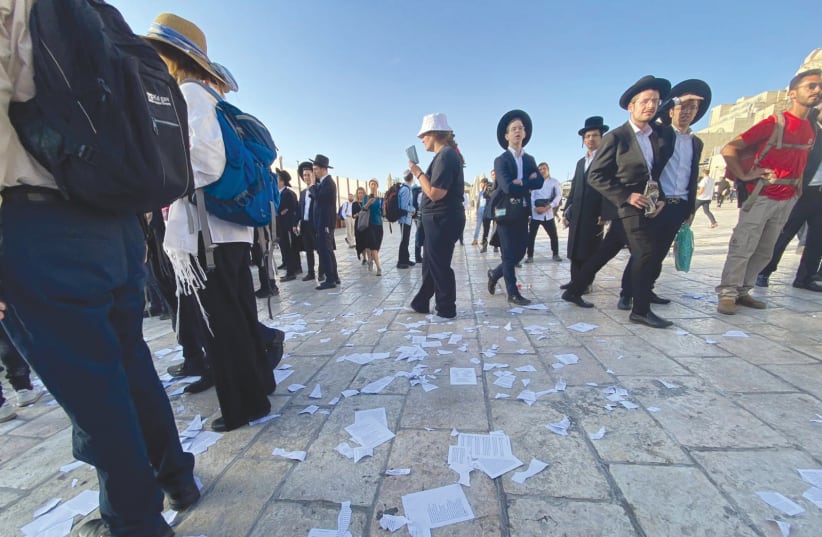Talmudic rabbis blamed these tragedies on what is called “sinat hinam” in Hebrew – baseless hatred. Sadly, it has again raised its ugly head, and we need to work together to quash it. Israeli society is beset by factionalism and polarization, distrust and a lack of compassion, inequality and selfishness. Baseless hatred is rife – too much of it. Here are just a few examples:
• As religious affairs correspondent Jeremy Sharon reported this week, an organization of religious-Zionist groups that calls itself the Joint Committee for Preserving the Holiness of the Western Wall is praying at the section reserved for non-Orthodox egalitarian prayer. Diaspora Affairs Minister Nachman Shai condemned the move as “baseless hatred,” noting that the area is the only place non-Orthodox groups have to pray at the Kotel.
• As noted by Yochi Rappeport, the executive director of Women of the Wall, a group of ultra-Orthodox men expressed intense hatred toward women who gathered to usher in the month of Av on July 11, tearing up 39 of their prayer books, jeering and laughing. “This hate crime can be likened to the baseless hatred we find in our history thousands of years ago,” she wrote.
• As political correspondent Gil Hoffman reported from the Knesset on Monday, Prime Minister Naftali Bennett and opposition leader Benjamin Netanyahu crossed the line of acceptable political discourse while accusing each other of mishandling the coronavirus pandemic. Netanyahu asked Bennett, “How did you succeed in destroying so much in such a short time in the struggle against corona?” while Bennett retorted, “You became sourpusses so fast that even when you see good things, you cannot give compliments.”
When President Isaac Herzog took his oath of office just a few days before, he made a point of urging the public “to change the tone, to lower the flames, to calm things down.”
Although his plea apparently went over the heads of the prime minister and his predecessor, Herzog added, “Baseless hatred, the same factionalism and polarization, are exacting a heavy price – today and every day. The heaviest price of all is the erosion of our national resilience.”
In order to combat this self-destructive phenomenon, we must stop hating each other, rally together as one people, and call out those who voice hate against Jews, Israelis and Israel itself.
According to the Mishna, one of the calamities that warrant fasting was the sin of the spies dispatched by Moses to survey the land of Canaan. Only two, Joshua and Caleb, returned with a glowing report, while the 10 others made negative observations for which they were punished by not being permitted to enter the land.
The midrash quotes God as saying, “You cried pointlessly,” saying this day would be marked as a day of crying for generations.
Have we learned our lesson? The answer in a word is no. We are too quick to judge and besmirch – one another and the State of Israel.
Instead of standing together, we divide into camps and assail the other. Rather than giving others – and our leaders – the benefit of the doubt, we lash out and cause harm.
If there is anything the coronavirus pandemic has taught us, it should be this: when we have a common enemy threatening our lives, we need to put aside our differences, close ranks and join hands to face the threat and overcome it.
In the past, the people of Israel repeatedly demonstrated how they can come together during times of crisis and war to fight for the common good and defeat their enemies. The secret to Israel’s national resilience, to which Herzog referred, was – and remains – its ability to keep the faith, not lose hope and be positive.
Baseless hate starts with each one of us. Let’s return to our roots and replace it with “ahavat hinam” (baseless love), or as Hillel phrased the unifying principle of Judaism, “What is hateful to you, do not do to your fellow.”
